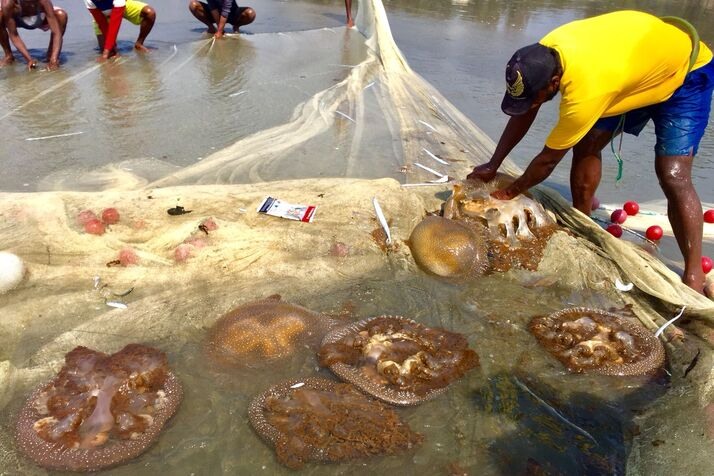Fishermen along the Cox’s Bazar coast are facing an unexpected challenge—nets meant for fish are instead catching thousands of jellyfish. Dead jellyfish have been washing ashore for the past two years, alarming locals and tourists. Experts attribute this surge, known as a ‘jellyfish bloom’, to climate change, declining sea turtle populations, overfishing, and rising salinity levels in the Bay of Bengal.
Impact of Climate Change and Marine Ecosystem Disruption
According to Soumitra Chowdhury, a scientific officer at the Bangladesh Oceanographic Research Institute (BORI), 22 species of jellyfish have been identified in the Bay of Bengal, most of which are edible. However, fishermen discard them back into the sea due to the lack of a local market. Additionally, rising sea temperatures and increasing salinity caused by climate change create ideal conditions for jellyfish to reproduce rapidly.
Disrupted Natural Order and the Decline of Sea Turtles
Saeed Mahmud Belal Haider, chairman of the Bangladesh Fisheries Development Corporation and a marine scientist, told Cox’s Bazar Life:
“Jellyfish are a primary food source for sea turtles. But with fewer turtles in the ocean, jellyfish populations are growing unchecked, making it harder for fishermen to catch fish.”
Impact on Fishermen’s Livelihoods and Possible Solutions
As jellyfish replace fish in nets, fishermen are suffering financially. However, scientists are optimistic. For six months, BORI has researched jellyfish harvesting, processing, and market development. Since jellyfish have international demand, exports could open new economic opportunities.
Experts emphasize the need for sustainable policies to combat climate change, protect sea turtles, regulate fishing, and promote coastal development. Additionally, fishermen’s struggles could become opportunities if jellyfish are considered a viable economic resource.
This unprecedented shift in the marine ecosystem poses a significant challenge to biodiversity and coastal communities. However, with the right policies and scientific research, Bangladesh could transform this crisis into a sustainable opportunity.
By Rajin Saleh
Photo: Polash Shikdar










